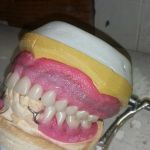How Your Diet Impacts Oral Health: The Best and Worst Foods for Your Teeth
- 1 - The Impact of Diet on Your Teeth
- 2 - Best Foods for Healthy Teeth
- 3 - Worst Foods for Oral Health
- 4 - Practical Tips for Maintaining Healthy Teeth
1. The Impact of Diet on Your Teeth
Your diet plays a crucial role in your oral health. Foods that are rich in essential nutrients can help strengthen your teeth and gums, while poor dietary choices can contribute to cavities, gum disease, and bad breath. The key lies in the balance of nutrients, vitamins, and minerals that directly affect the strength and appearance of your teeth.
For example, a diet high in sugary foods leads to the accumulation of plaque, which can erode the enamel and eventually lead to tooth decay. On the other hand, a diet rich in calcium and vitamins D and C can help keep your teeth strong and your gums healthy. But how exactly do specific foods contribute to oral health?
2. Best Foods for Healthy Teeth
Incorporating the right foods into your diet is essential for maintaining optimal oral health. Here are some of the best foods for your teeth:
- Cheese and Dairy Products: Rich in calcium and phosphates, these foods help remineralize your enamel and prevent cavities.
- Leafy Greens: Packed with vitamins and minerals, leafy greens like spinach and kale help strengthen teeth and gums.
- Crispy Fruits and Vegetables: Apples, carrots, and celery act as natural abrasives, helping to clean teeth and massage gums.
- Green Tea: Known for its antioxidant properties, green tea can reduce inflammation in the gums and help fight bacteria.
- Nuts and Seeds: Rich in healthy fats and essential nutrients, nuts like almonds and seeds promote gum health and provide a natural source of calcium.
Including these foods in your diet can help prevent common dental problems, from tooth sensitivity to gum disease. By nourishing your body with the right nutrients, you're giving your teeth the care they need to remain strong and healthy.
3. Worst Foods for Oral Health
While some foods are great for your teeth, others can harm them significantly. Here are some of the worst foods for oral health:
- Sugary Snacks: Foods like candies, cakes, and sodas are full of sugar, which feeds harmful bacteria in your mouth, leading to cavities and decay.
- Acidic Fruits and Drinks: Citrus fruits and juices can erode enamel over time, making your teeth more vulnerable to decay.
- Starchy Foods: Foods like chips and bread can get stuck in your teeth, providing a food source for bacteria that can lead to cavities.
- Alcohol: Excessive alcohol consumption can dry out your mouth, reducing saliva production and allowing bacteria to thrive.
- Coffee and Tea with Sugar: While coffee and tea have their benefits, adding sugar or drinking them excessively can stain teeth and contribute to decay.
Avoiding or minimizing the intake of these foods will go a long way in maintaining your oral health and preventing long-term dental problems.
4. Practical Tips for Maintaining Healthy Teeth
In addition to choosing the right foods, there are several practical steps you can take to maintain healthy teeth:
- Brush Regularly: Brush your teeth twice a day with fluoride toothpaste to remove plaque and prevent tooth decay.
- Floss Daily: Flossing removes food particles stuck between your teeth and prevents gum disease.
- Stay Hydrated: Drink plenty of water throughout the day to keep your mouth moist and wash away food particles and bacteria.
- Visit Your Dentist: Regular dental check-ups can help catch issues early and keep your teeth in top shape.
By following these tips and incorporating the right foods into your diet, you can ensure your teeth stay healthy for years to come. Remember, a little attention to your diet and dental care can make a big difference in the long run.
If you want to learn more about how your diet affects your teeth, explore the various supplements and dental products designed to support oral health. Whether you're looking for calcium-rich products or tools to help maintain healthy teeth, investing in your oral health now can save you from expensive dental bills later.







 Wilshire Periodontics & Dental5.0 (2 review)
Wilshire Periodontics & Dental5.0 (2 review) Classic Dental Laboratory0.0 (0 review)
Classic Dental Laboratory0.0 (0 review) Lakeview Dental PC4.0 (29 review)
Lakeview Dental PC4.0 (29 review) Grafton Dental Care4.0 (152 review)
Grafton Dental Care4.0 (152 review) Dental Health Associates - Sun Prairie Clinic4.0 (622 review)
Dental Health Associates - Sun Prairie Clinic4.0 (622 review) Honey Creek Dental4.0 (58 review)
Honey Creek Dental4.0 (58 review) The Importance of Oral Health Education During Pregnancy for a Healthy Pregnancy
The Importance of Oral Health Education During Pregnancy for a Healthy Pregnancy Best Tips for Brushing Your Teeth Properly for Healthy Gums: Essential Techniques for Oral Health
Best Tips for Brushing Your Teeth Properly for Healthy Gums: Essential Techniques for Oral Health Why Skipping Dental Checkups Can Lead to Bigger Oral Health Problems
Why Skipping Dental Checkups Can Lead to Bigger Oral Health Problems Advantages of Porcelain Dental Restorations
Advantages of Porcelain Dental Restorations How Can Diabetes Cause Tooth and Gum Problems? Preventing and Managing Oral Health Issues
How Can Diabetes Cause Tooth and Gum Problems? Preventing and Managing Oral Health Issues Healthy Habits for Promoting Good Oral Health and Hygiene: Tips for a Healthy Smile
Healthy Habits for Promoting Good Oral Health and Hygiene: Tips for a Healthy Smile